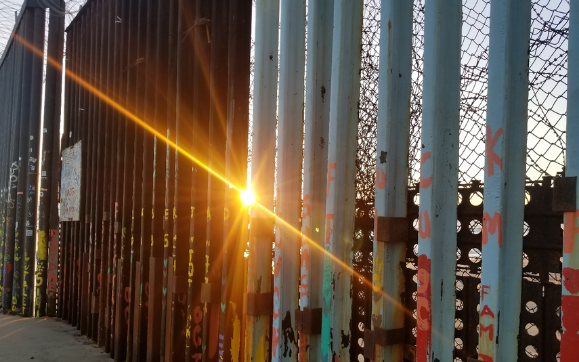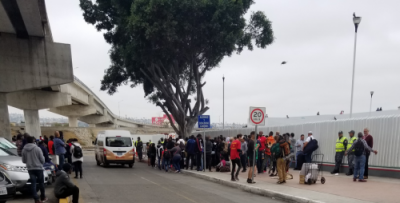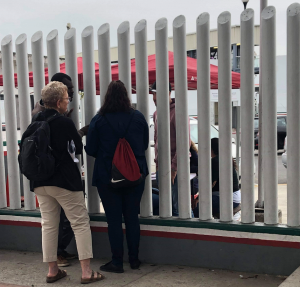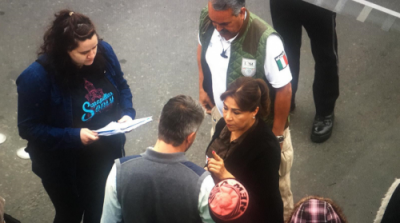Justice Center News
The Justice Center News blog features our advocacy on issues affecting low-income New Yorkers today and the latest CBJC happenings. For press releases, click here. For publications, click here.

7 Days on the Border
by Rachel Searle July 23, 2019
It comes as no surprise to people that it is becoming increasingly difficult to seek asylum in the United States. Stephen Miller, this administration’s top immigration policy advisor to President Trump is quoted as saying that he “would be happy if not a single refugee foot ever again touched American soil.” I spent a week in June at the Chaparral port of entry in Tijuana, Mexico witnessing firsthand the steps the U.S. government is taking to make Miller’s horrifying vision a reality.
As a volunteer with Al Otro Lado, my primary responsibilities were to observe what is happening at the port of entry in Chaparral (San Ysidro on the U.S. side), ensure that human rights were not being violated, track the number of people allowed to cross each day, and provide individual consultations to asylum seekers. As an immigration attorney, I felt that I had a firm grasp of the Administration’s systematic steps towards closing off the country to asylum seekers. Nothing prepared me for what I saw, however.
Each morning people fleeing violence arrive at Chaparral only to be told they must put their name on a list to get a number and then wait an indefinite amount of time for that number to be called in order to step beyond the midpoint barrier into U.S. territory and ask for asylum. The waitlist is managed by fellow asylum seekers, “list managers,” who rotate out once their turn to cross finally arrives. Handwritten numbers are given out on scraps of paper and waitlist names are recorded in a notebook. Grupos Beta, the Mexican immigration authority at the border, oversees the administration of the list, but leaves the responsibility and blame to list managers. The list barely moves because U.S. Customs and Border Protection (CBP) began to strictly limit the number of asylum seekers allowed to enter the U.S. each day – a policy it calls “metering.” And so asylum seekers wait, for weeks or (increasingly) months on the Mexican side of the border.

This chaotic process is compounded by language barriers, cultural differences, corruption, and the confusion of hundreds of people desperate to find a safety. Grupos Beta is known to take bribes to allow people to obtain a higher number to move up the waitlist. During my time there, a fellow volunteer heard a Mexican immigration officer openly soliciting sexual favors from a woman on line in exchange for moving up the list so as to cross earlier. List managers are typically Spanish speaking and from Mexico or Central America. This has led to many asylum seekers being told they cannot even get on the waitlist because their identifying documents look different or they do not speak Spanish. Cameroonians and other asylum seekers from Africa have especially faced barriers. However, getting on the waitlist is only the first hurdle. Once on the list, asylum seekers typically have to wait months before their number is called. They are left without shelter, food, or safety during this purgatorial period.

During my time in Tijuana, I saw countless examples of how the waitlist, metering, and the Remain in Mexico policy are harming an extremely vulnerable population. I did a legal consultation with a transwoman from Honduras who had fled her country to Guatemala, then to Mexico due to persecution. Only months after being granted asylum in Mexico, she and a friend, another transwoman, were attacked by a gang. They killed her friend and slit this woman’s throat, leaving her to die in the street. Miraculously, she survived and was now seeking asylum in the United States. However, due to U.S. policies now in place, she will likely have to wait months in a country in which she has been terrorized before being able to seek humanitarian protection.
The most egregious mistreatment I saw, though, occurred when a couple from Togo was separated at Chaparral. The wife was eight months along in a high-risk pregnancy. She only spoke French, but her husband, who knew all her medical history, spoke both French and Spanish. He was her only support and advocate. Low down on the list, it would likely be months before they were called. At the last doctor appointment, the couple learned the umbilical cord was wrapped around the baby’s neck and they feared they could not receive proper medical service for the delivery in Tijuana. Grupos Beta had been preventing the wife from entering, but finally agreed that she could cross before their number was called. But inexplicably, they refused to allow her husband to accompany her. I advocated strongly to allow them to cross together. When I attempted to speak to the list managers, a Grupos Beta officer told me I was not allowed to do so. I tried to explain the situation to the officer, who said that “there was no room for him.” I not only knew this to be untrue, but was also aware that when Grupos Beta allows one family member to cross early, they typically permit the whole family to join, and so I renewed my efforts.

The husband and I again approached the officer to show their marriage certificate and explain the situation. We were joined by another volunteer. A woman, who we later learned was Rosario Lozado, a high ranking official of Grupos Beta, then approached and demanded to see our passports. When the other volunteer refused, Ms. Lozado and another officer forcefully removed the volunteer from the area. As this was happening, a third volunteer took a picture of the forceful actions. Ms. Lozado witnessed her taking the photo and had her detained. The volunteer was taken into the Grupos Beta offices, where they erased the photo from her phone and held her for half an hour. Ultimately, the husband was not allowed to go with his wife. Separated, she will now likely undergo a high risk delivery alone and her husband will miss the birth of their child.
The gradual, systemic changes to the asylum process are directly harming people who have already been traumatized as the victims of violent persecution. They are not leaving everything they know to make arduous, life-threatening journeys to the border in order to cause harm to the United States. They are seeking safety and freedom, but are instead met with intentionally placed barriers and further victimization. As I write this, the U.S. government is taking steps to further limit people’s ability to seek asylum through third country transit restrictions. Even if a policy change seems small, it has widespread effects on real people who are in real danger. Regardless of how it is presented, it is a calculated step to reach the goal of keeping refugee feet off U.S. soil.
Click here if you are an immigrant looking for basic immigration resources.
Rachel Searle is a Staff Attorney and Immigrant Justice Corp Fellow on the City Bar Justice Center’s Immigrant Justice Project.
Recent posts
-
June 11, 2024
NELP and Partners Serve 40 Small Business Owners For National Small Business Month
In honor of National Small Business Month 2024, the City Bar Justice Center’s Neighborhood Entrepreneur Law Proj...
Read more -
April 22, 2024
NELP and Partners Empower Small Businesses on Annual Financial Institution Pro Bono Day
The City Bar Justice Center’s Neighborhood Entrepreneur Law Project (NELP) was proud to participate in the 5th A...
Read more -
April 19, 2024
Statement of the Executive Director of the City Bar Justice Center Opposing IOLA Diversion and the Undermining of Complementary Public Service Programs
The City Bar Justice Center strongly opposes the inclusion in the FY2024-25 New York State budget of an eleventh-h...
Read more














